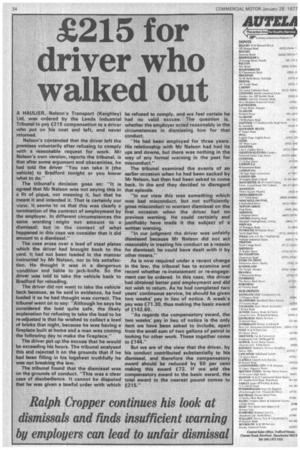£215 for driver who walked out
Page 38

If you've noticed an error in this article please click here to report it so we can fix it.
A HAULIER, Nelson s Transport (Keighley) Ltd, was ordered by the Leeds Industrial Tribunal to pay £215 compensation to a driver who put on his coat and left, and never returned.
Nelson's contended that the driver left the premises voluntarily after refusing to comply with a reasonable request for work. Mr Nelson's own version, reports the tribunal, is that after some argument and obscenities, he had told the driver You can take it (the vehicle) to Bradford tonight or you know what to do."
The tribunal's decision goes on "It is agreed that Mr Nelson was not saying this in a fit of pique, not meaning it but that he meant it and intended it. That is certainly our view. It seems to us that this was clearly a termination of the contract of employment by the employer. In different circumstances the same wording might not amount to a dismissal; but in the context of what happened in this case we consider that it did amount to a dismissal."
The case arose over a load of steel plates which the driver had brought back to the yard. It had not been loaded in the manner instructed by Mr Nelson, nor to his satisfaction. He thought it was in a dangerous condition and liable to jack-knife. So the driver was told to take the vehicle back to Bradford for reloading.
The driver did not want to take the vehicle back because, as he said in evidence, he had loaded it as he had thought was correct. The tribunal went on to say: "Although he says he considered the load quite safe, the likely explanation for refusing to take the load to be re-adjusted is that he wished to collect a load of bricks that night, because he was having a fireplace built at home and a man was coming the following day to make the fireplace."
The driver put up the excuse that he would be exceeding his hours. The tribunal analysed this and rejected it on the grounds that if he had been filling in his logsheet truthfully he was not breaking the law.
The tribunal found that the dismissal was on the grounds of conduct. This was a clear case of disobedience. It cannot be disputed that he was given a lawful order with which he refused to comply, and we feel certain he had no valid excuse. The question is, whether the employer acted reasonably in the circumstances in dismissing him for that conduct.
"He had been employed for three years. His relationship with Mr Nelson had had its ups and downs, but there was nothing in the way of any formal warning in the past for misconduct."
The tribunal examined the events of an earlier occasion when he had been sacked by Mr Nelson, but then had been asked to come back. In the end they decided to disregard that episode.
"In our view this was something which was bad misconduct, but not sufficiently gross misconduct to warrant dismissal on the first occasion when the driver had no previous warning. He could certainly and justifiably have made it the subject of a written warning. "In our judgment the driver was unfairly dismissed because Mr Nelson did not act reasonably in treating his conduct as a reason for dismissal; he could have dealt with it by other means."
As is now required under a recent change in the law, the tribunal has to examine and record whether re instatement or re-engagement can be ordered. In this case, the driver had obtained better paid employment and did not wish to return. As he had completed two years' continuous service, he should be given two weeks' pay in lieu of notice. A week's pay was £71.30, thus making the basic award of £142.60.
"As regards the compensatory award, the two weeks' pay in lieu of notice is the only item we have been asked to include, apart from the small sum of two gallons of petrol in looking for other work. These together come to £144."
But we are of the view that the driver, by his conduct contributed substantially to his dismissal, and therefore the compensatory award should be reduced by SO per cent making this award £72. If we add the compensatory award to the basic award, the total award to the nearest pound comes to £215,"


































































































